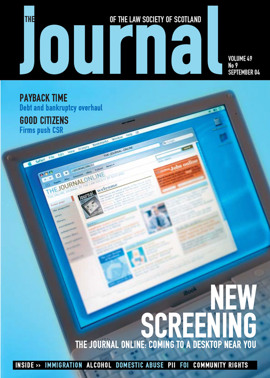Book reviews
Few firms nowadays can boast they have never suffered a claim for professional negligence. One’s own mistakes are instructive but painful and expensive. The mistakes of others, wisely absorbed, can deliver the education without the impact on health or wealth. That is the function of this latest volume from the ever productive Professor Rennie. Read, and avoid, is the message.
In his introduction Rennie rightly warns against treating his opinions as precedents. The facts are all: in one place the solicitor has given due advice, recorded having given it, and successfully repudiates the complaint. In another he has either not so advised or not so recorded, and thus is liable.
A refrain then, as the book unfolds, is the distinct versions of events given by the disgruntled client on the one hand and the offended solicitor on the other. As is my own experience in giving opinions (albeit without professorial authority) in the same field, the solicitor’s account is often cogent and credible, but utterly unsupported by file notes or advising letters. In an evidential contest, as Rennie notes, courts tend to favour the client, as the innocent abroad, and so the solicitor goes down. Keep good file notes and write down the advice you give.
As you read, you may find fear and despair sliding their cold tentacles around your professional self-esteem. Sod’s Law is rampant: you prepare a security a thousand times, and it’s never needed. You overlook recording it once, because a localised nuclear war has wiped out your family and staff, and the borrower goes bankrupt before the keys have been picked up.
A common mistake is what I call style-blindness. Standard wording, say in missives, is adopted or accepted without due thought. Have a look at Opinion 17, and tremble. A routine two year supersession clause operated to cut down an important obligation on the seller to convey additional ground if planning permission was refused. Opinion 22 has more.
Sometimes I think Rennie is a bit harsh – e.g. Opinion 14. But equally he is not afraid to be supportive of the solicitor even when things have gone seriously wrong – see Opinion 4.
Opinion 36 describes a firm’s efforts, or more accurately total lack thereof, to prepare and record a standard security. “Incompetence” simply does not encapsulate the pig-ignorant ineptness of their performance. This example, and others I could draw on from my own experience, leaves one gasping in astonishment that the solicitors concerned ever made it into the profession at all, and angered that they are still there, with all of us paying for their fecklessness in higher premiums. Although interesting reading, I do not find such cases of practical use in a volume like this because the errors are simply off the scale of crassness to which ordinary conscientious solicitors would ever be prone.
I am also pleased to note that Rennie is occasionally wrong. In Opinion 44 he records his own criticism of solicitors in a question of a duty of disclosure to lenders for whom they were acting as well as for the borrowers. Despite the majesty of the Rennie opinion the solicitors toughed it out until Lady Paton found in their favour in the Court of Session. Rennie is humble enough to record this outcome and I feel it is my own duty, as reviewer, to underline this fallibility.
The volume is wide-ranging in its scope. Rennie’s approach is to set out the facts at the beginning of his opinion and offer his views towards the end. In between he includes a CV pen picture of his glittering career and a summary of the standard of care incumbent on solicitors. This appears, in almost identical form, in every opinion in the book. I calculate this to be about 20% of its length. Practitioners dipping into the book for a particular matter may find it useful for this material to appear at the relevant point, but I cannot help feeling that a more elegant solution than this mammoth repetition could have been found.
In summary, there is material here to gladden and sadden the heart: emotions which are alike useful as we seek to stay ahead in our risk management. It is a beneficial read in itself and when, as inevitably you will, you find yourself grappling with a situation which matches one of the 76 opinions supplied, you will have struck gold.
Pedants will be disappointed that the learned Professor is an enthusiastic exponent of the split infinitive.
Donald B Reid, Mitchells Roberton
In this issue
- Profession's voice must be heard
- Let the cameras speak
- Vision on
- Forgive us our debts
- Written down
- DAS: the broader picture
- A lost message
- For the greater good
- Start your engines
- Are you covered?
- Opportunity knocks
- Rock bottom?
- BAILII looks for help
- On level ground
- Taking freedom seriously
- Taking out abuse
- Be ready for the options hearing
- Now it's collaborative
- Winning around a table
- Website reviews
- Scottish Solicitors' Discipline Tribunal
- Book reviews
- Beware all conveyancers!
- A-day looms closer






